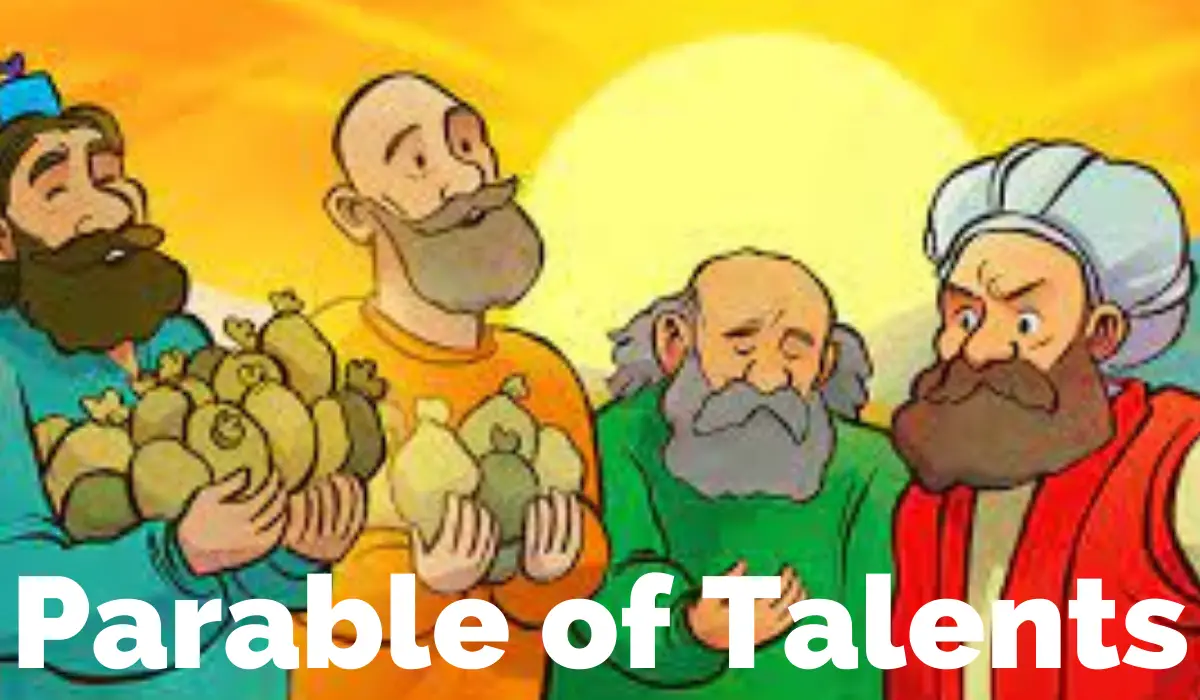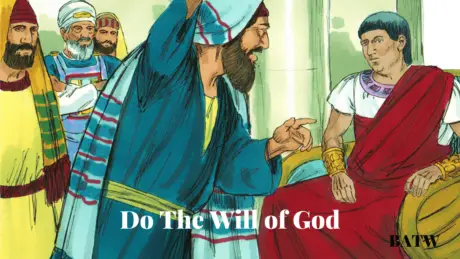Parable of the Talents Point of Views
Why are so many people, and most of them are Christians, confused about the Parable of the Talents?
Some say it’s about demonstrating that we are all not equal; others say, it’s about investment; few declare, it’s about gifts, and a spatter of them claim, it’s about talents.
But what else could this proverb of Jesus Christ be about?
As I always say, Believers don’t need to be confused about the Word of God, for it explains itself.
Thus, I aim to utilize the Bible and only the Bible to explicate the Parable of the Talents.
Come with me, let’s learn from the Word!
If you are unclear about what is a parable, this Bible study will assist you!
Additionally, why Jesus Spoke in Parables shall aid you in understanding the Parable of the Talents.
Details of The Parable of The Talents
The main Bible references for this Bible Study are Matthew 25:14-30 and Luke 19:11-27.
Matthew Chapter Twenty-Five is one of the few chapters in the Bible where Jesus taught a plethora of parables in one day and one place!
No other of Jesus’ Apostles capture as many parables of Jesus in one place as Apostle Matthew.
According to him, Jesus begins his proverb by informing us what it is about.
Recall that I demonstrated that a parable is personal. Only the creator of it knows the meaning of it.
As a result, we should never attempt to interpret it. Instead, allow the creator to explain its meaning to us.
And that is exactly what Jesus did with his Parable of the Talents.
Thus, he compares the behaviors of a master and his servants in a well-known Jewish setting.
He explains, “For the kingdom of heaven is as a man travelling into a far country, who called his own servants, and delivered unto them his goods” (Matthew 25:14).
So, Jesus is assessing the behaviors of all the servants and those of the “Master” to teach us an aspect of the Kingdom of Heaven.
The Initial Distribution of Talents
After the “Master” distributed “his goods” to all his “servants”, he took his journey (Matthew 25:14).
Note, too that the Master didn’t distribute his entire possession or portfolio to his servants.
He distributed to his servants according to their different abilities and competencies.
“And unto one he gave five talents, to another two, and to another one; to every man according to his several [abilities]; and straightway took his journey” (Matthew 25:15).
Before we go much farther, understand what is a talent by reading this article, then return here to continue learning from this proverb of Jesus Christ?
Next, observe how each servant behaves concerning the talents that he received.
“Then he that had received the five talents went and traded with the same, and made them other five talents” (Matthew 25:16).
What is an Alternate Meaning of the Parable of the Talents?
The servant that received five talents “traded with” them and yielded a one hundred percent increase.
At this point, we are uncertain whether “talents” here are “goods” or something else (Matthew 25:14).
Similarly, the servant who got two talents “gained” two other talents on his initial allocation.
He too has increased his talents by one hundred percent.
“And likewise he that had received two, he also gained other two” (Matthew 25:17).
However, our understanding of what talents are is about to change.
“But he that had received one went and digged in the earth, and hid his lord’s money” (Matthew 25:18).
In this proverb, the Bible tells us that talent is money. Therefore, talents, in this context, are not gifts but money.
Because the servant who received one talent went and hid his master’s money in the ground (Matthew 25:18).
The Reckoning – Is The Parable of The Talents About Money?
Then comes the time when the master returns and requires all his servants to give an account of how they handled his money.
“After a long time the lord of those servants cometh, and reckoneth with them” (Matthew 25:19).
We could look at the servant who received “five talents” and produced five more on those.
He increased his portfolio by one hundred percent.
“And so he that had received five talents came and brought other five talents, saying, Lord, thou deliveredst unto me five talents: behold, I have gained beside them five talents more” (Matthew 25:20).
Having behaved prudently and practically the Master verbally commended this servant.
“His lord said unto him, Well done, thou good and faithful servant: thou hast been faithful over a few things, I will make thee ruler over many things: enter thou into the joy of thy lord” (Matthew 25:21).
Could This Parable Be About Investment?
Similarly, the servant who got two talents was successful for he increased his initial collection also by one hundred percent.
“He also that had received two talents came and said, Lord, thou deliveredst unto me two talents: behold, I have gained two other talents beside them” (Matthew 25:22).
And as he said to the first servant, the Master said the same thing to this servant.
“His lord said unto him, Well done, good and faithful servant; thou hast been faithful over a few things, I will make thee ruler over many things: enter thou into the joy of thy lord” (Matthew 25:23).
Finally, we are at the last and wicked servant!
Why Does the Bible Describe this Servant as Wicked?
“Then he which had received the one talent came and said, Lord, I knew thee that thou art an hard man, reaping where thou hast not sown, and gathering where thou hast not strawed” (Matthew 25:24).
Another glimpse into this narration is the fact that the servant calls his master “Lord” (Matthew 25:24).
But there’s but one Lord and he is even Christ Jesus our Lord.
Observe, in the verse-of-scripture following, the reason the “wicked servant” hid his master’s money.
“And I was afraid, and went and hid thy talent in the earth: lo, there thou hast that is thine” (Matthew 25:25).
So, he was fearful. Probably “afraid” of losing it!
“His lord answered and said unto him, Thou wicked and slothful servant, thou knewest that I reap where I sowed not, and gather where I have not strawed” (Matthew 25:26).
I have explained that “talent” represents cash. The following Scripture will confirm this further.
“Thou oughtest therefore to have put my money to the exchangers, and then at my coming I should have received mine own with usury” (Matthew 25:27).
The “Master” had certain expectations of his servants! They, in turn, had certain unsaid responsibilities.
They were to increase what they received by at least thirty percent and not returned it as they received it.
What is the Lesson in the Parable of the Talents?
“Take therefore the talent from him, and give it unto him which hath ten talents” (Matthew 25:27; Luke 19:24).
The Lord Jesus Christ explained everything above to get to this point.
He narrated this parable to impart the following Kingdom Principle to Believers in him:
“For unto every one that hath shall be given, and he shall have abundance: but from him that hath not shall be taken away even that which he hath” (Matthew 25:29; Luke 19:26).
Unsaved will read this and not perceive it because this principle is working against them, and also, because they represent the twenty-five percent in the Parable of the Sower!
But this wasn’t the first time Jesus was making this declaration.
However, when he spoke on it, it wasn’t the focus of his revelation.
This is one of the mysteries of the kingdom of heaven that all Believers should understand.
Jesus revealed this “dark saying” to his followers when he supplied the meaning of the Parable of the Sower.
“For whosoever hath, to him shall be given, and he shall have more abundance: but whosoever hath not, from him shall be taken away even that he hath” (Matthew 13:12; Luke 8:18).
This too is another reason the interpretation of the Parable of the Talents has nothing to do with money, or gifts, or investments.
What is the Meaning of the Parable of The Talents in the Bible?
Only to the extent that Jesus chose those details to narrate this great and formerly hidden truth.
Then, how is the Parable of the Sower connected to the Parable of the Talents?
If they were not, why then would Jesus issue the identical principle in explaining both?
Both parables are about the Kingdom of Heaven.
This is a key principle of how the Kingdom of Heaven operates.
“Take heed therefore how ye hear: for whosoever hath, to him shall be given; and whosoever hath not, from him shall be taken even that which he seemeth to have” (Luke 8:18).
Jesus gave all the details of the narration of the servants just to supply this principle.
So don’t get lost in the forest because of the trees!
I’m certain that you have experienced this principle in your life.
Have you ever wondered why rich or wealthy people keep on getting richer or wealthier?
But poor people remain poor?
What is the Message of the Parable of The Talents?
Or if you are trying to save generally or to save for a specific purpose, it’s difficult or easy depending on your status.
If you have nothing, it’s difficult to start but once you start saving it’s easy to continue and grow.
If you are a YouTuber and need subscribers, getting your first subscriber is hard.
And getting your first hundred subscribers is very difficult but having gotten them getting more subscribers is easy.
It’s much easier for a person who owns a house or houses to purchase more houses than it is for someone who does not own any in the first place.
All because this kingdom principle is at work with or against us every day.
Understanding it and how it operates is empowering ourselves for success in every area of our lives every day!
“And cast ye the unprofitable servant into outer darkness: there shall be weeping and gnashing of teeth” (Matthew25:30).
The Parable of The Talents is Relevant to Whom?
Jesus told this parable to the people but only his followers comprehend this narration.
They alone understood that the Parable of the Talent is not about money, not about gifts, neither about investment but rather it’s about how the Kingdom of Heaven operates.
Thus, if you are a Believer in Jesus Christ knowing this Kingdom Principle and how it functions should empower you.
You will realize that whenever you desire something good work with this principle of the Kingdom and not against it and you will succeed as long as you persist to the end.
In other words, allow this principle of the Kingdom to work in your favor, to work for you.
And it works for everyone. Whether you are a sinner or saint this Kingdom principle works with or against you every day in all that you do.
Do you desire to understand the Bible better, then understand the Parable of the Sower and you will comprehend all other parables?
This Kingdom principle will work with you and until you could understand any Scripture in the Bible because this principle is working with and for you.
But if you never understood the parable of the Sower this rule will work against you.
Conclusion
Each of Jesus’ parables has only one biblical meaning. Recall what Jesus says at the start of this narration?
“The Kingdom of heaven is as a man travelling into a far country, who called his own servants, and delivered unto them his goods” (Matthew 25:14).
His opening statement guides us in the Parable of the Sower also and it was identical, (Matthew 13:19).
Thus, Jesus desires to reveal to us the hidden wisdom of God concerning the operation of the Kingdom of Heaven.
But he’s utilizing the master-servant relationship to explain it because then that association was popular and well understood.
Today, thousands of years later, these principles are as relevant to us now as they were then.
Believers should never get side-track by the many applications of this “dark saying” of Jesus Christ.
He wants us to grasp one concept and only one from his exposition.
When Will the Parable of the Talents Becomes Important?
In other words, when will the reckoning of the “Master” takes place?
At the second advent of our Lord!
So how is money and gifts and talents relevant then? They are not, but the one thing that Jesus expects us to be accountable for is our handling of his Word.
He desires that we understand the “mysteries of the kingdom of Heaven”.
Note, too that these “dark sayings” could only be understood by born-again Believers in Jesus Christ.
Everyone will never perceive them!!
They cannot because they are spiritual things and only, he or she who has been born of water and born of Spirit could comprehend such truths.
Finally, that’s why Jesus taught them in proverbs!! Parables!
Book Recommendation
The link below is an affiliate one. This is a link to Amazon to my first book. Many of the principles I discussed in this Bible Study I have examined at length in “Living Soul: In The Image of God”.
When you purchase “Living Soul” through it, I will receive a small commission to support this website. Thank you for assisting me to continue this great work.



